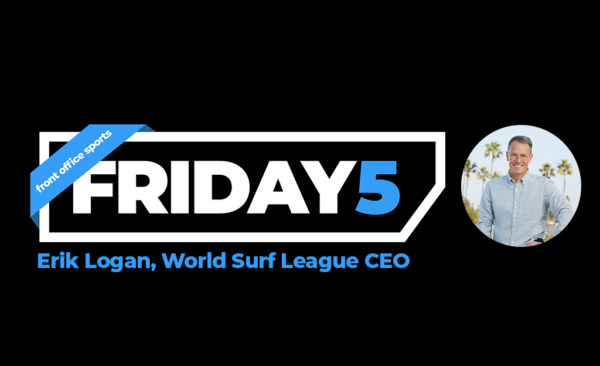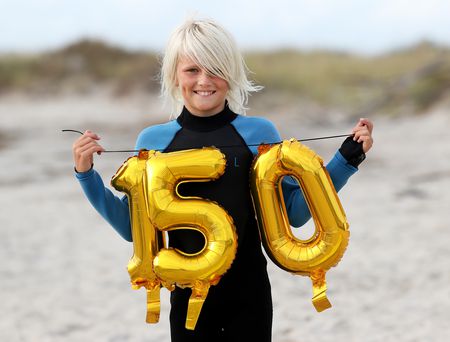
Surfing will make its Olympic Games debut this year in Tokyo, and there are few people more excited to ride the swell of momentum likely to come to the sport than Erik Logan, the CEO of the World Surf League.
Logan was named to that position in January after previously serving as the WSL’s president of content, media, and studios since February 2019.
He said it’s near impossible to try to quantify or even describe the potential impact Olympics can have on the growth of the sport and the league – “it’s hard to put it into one sentence what I think it will mean, but It will be substantial,” he said.
It also comes as a perfect time for the WSL, which set multiple viewership and engagement records last year. It has a slate of content plans for 2020 that aim to both satisfy current fans while also reaching new ones, such as a surfing-focused competition series that will air on ABC this summer- projects that Logan championed in his previous role.
Front Office Sports spoke with Logan just a few weeks into his tenure to get his lay of the land at the WSL, the different ways the league is looking to grow, and how it plans to take advantage of the wave and potential multi-million dollar opportunity the Olympics has put in front of it.
FOS: What has been driving the momentum for the WSL?
Logan: There are three really major things in front of us. The first is the talent level of our women and men, and the new faces and new locations were going to this year has us positioned for one of our best competitive years we’ve ever had in the sport. So the narratives there are great and rich. We also have the solidification of the Olympic teams, as we qualified 18 of the surfers for the Olympics through our Championship tour points.
FOS: Surfing will make its debut in the Olympics this year – what does that do for the sport, as well as for WSL?
Larson: We’re getting ready for whatever will happen, leading to, through, and post the Olympics in every facet to our organization. From athletes to athlete communication to a reimagined digital product to shoulder programming – honestly, it’s permeating every aspect of our organization. We’re trying to ready for as many different outcomes as possible for the Olympics. We recognize and see the historic nature of what this means to the sport, and we have also studied and looked at what the debut and status of being an Olympic sport has done for other sports. It is truly a transformative moment for surfing, and we’re prepared. We are excited, and we’re very excited to see what happens.
FOS: How are looking to create content for a more mainstream audience?
Larson: We recently sold a broadcast network television show to ABC called Ultimate Surfer, and we’ve started taping that, but that will debut in the summer. That will provide a platform for surfing in the U.S. specifically that has never been seen before.
When look back over the past 11 months or so, the work the team has done to create all of these other franchises that we have on our platforms, like Sound Waves and Brilliant Corners and these other series we put on in-between events, in addition to the things we’ve done off-platform whether that’s 24/7: Kelly Slater [with HBO Sports], Ultimate Surfer, and the other things we have in the pipe, what we’ve seen is that the success rate, the consumption, and the use of the platforms really have all grown exponentially, and it gives us great confidence to double down in that space.
We’re going to continue to accelerate this transformation into a sports media company. Historically, the WSL has been effectively a league that has been the home of professional surfing since 1976 and crowning world champions – we will continue to forever do that.
What we’re doing now is transforming a sports league into a sports media company, and the media company part is this evolution. I keep telling our teams – this is accelerated evolution, not a revolution because we’re already doing many of the things individually now, we need to do more of them quicker.
FOS: How do you make sure you’re satisfying core fans with the content you’re putting out?
Larson: The league works like a lot of other leagues once you get to the last third of the season or so, it becomes about the world titles, re-qualification scenarios, and other positioning scenarios. For our core viewers, that is extremely important and drives so much of the consumption of our content. There will also be narratives born out of the Olympics that will also help craft the back half of the year from a content perspective.
While we’re leaning heavily into narratives like that, we also now have a full development slate for programming that we’re in active conversations with our platforms about. That’s for things like the Kelly Slater – HBO Sports 24/7 show.
We’re in the market right now pitching a surfing version of the Netflix show “Drive To Survive,” working with the same production company. We’re also in full production of a Kelley Slater documentary where we’ve spent the entire year with Kelly with unfettered access.
We know there is core league content that we can put out on our platforms, and then we have that from a studio perspective. Our goal is to have all of that happening in the background so we can create narratives and help create stories that connect the global surf community.
FOS: What can the WSL do to make sure it’s attracting more non-endemic brands to invest in the league, the athletes and the sport, especially with the Olympics on the horizon?
Larson: What we’re starting to see through the proliferation of all the other content verticals and our content and the way we’re hitting audiences on all of these different platforms, it’s opening tremendously more doors to non-endemic sponsors like Lululemon, like Swatch, like HydroFlask. It’s also encouraging them to do more with us that goes beyond our live play-by-play. I think if you put that on a stage with the backdrop of Olympic narrative and what’s happening more broadly in the sport, I think we’re at an all-time high in terms of partners wanting to get involved, and they’re increasingly looking for new ways to get involved.





Recent Comments